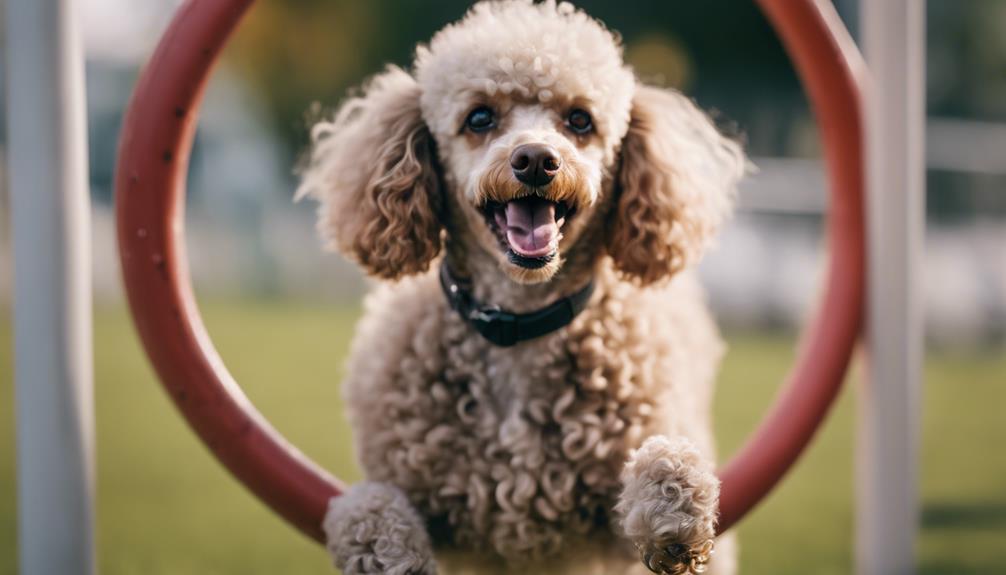You might think you've got your Poodle all figured out, but have you truly explored the depths of their behavior? From their quirky playfulness to their sometimes surprising communication methods, Poodles have a lot going on beneath that fluffy exterior. Understanding these common traits and quirks can help you navigate the intricate world of Poodle behavior with finesse. So, are you prepared to unravel the mysteries that make your Poodle the unique companion they are?
Key Takeaways
- Poodles are elegant, intelligent, and expressive dogs.
- They excel in problem-solving, obedience training, and quick learning.
- Regular exercise, socialization, and mental challenges are crucial for their well-being.
- Training strategies, consistency, and enrichment activities help manage their behavior effectively.
Poodle Behavior Overview

Have you ever wondered what makes Poodle behavior so unique and fascinating among dog breeds? Poodles stand out not only for their elegant appearance but also for their intelligence and expressive nature. Their behavior is a blend of playfulness, loyalty, and sensitivity, making them beloved companions. Understanding Poodle behavior is essential for effective training and care throughout their different life stages.
Training plays a crucial role in shaping a Poodle's behavior. Due to their high intelligence, they are quick learners and thrive on mental stimulation. Consistent training helps manage and correct any undesirable behaviors that may arise. Poodles enjoy interactive playtime and socialization, which are vital for their overall well-being. Engaging in training activities not only helps them stay well-behaved but also strengthens the bond between you and your Poodle.
Intelligence and Trainability
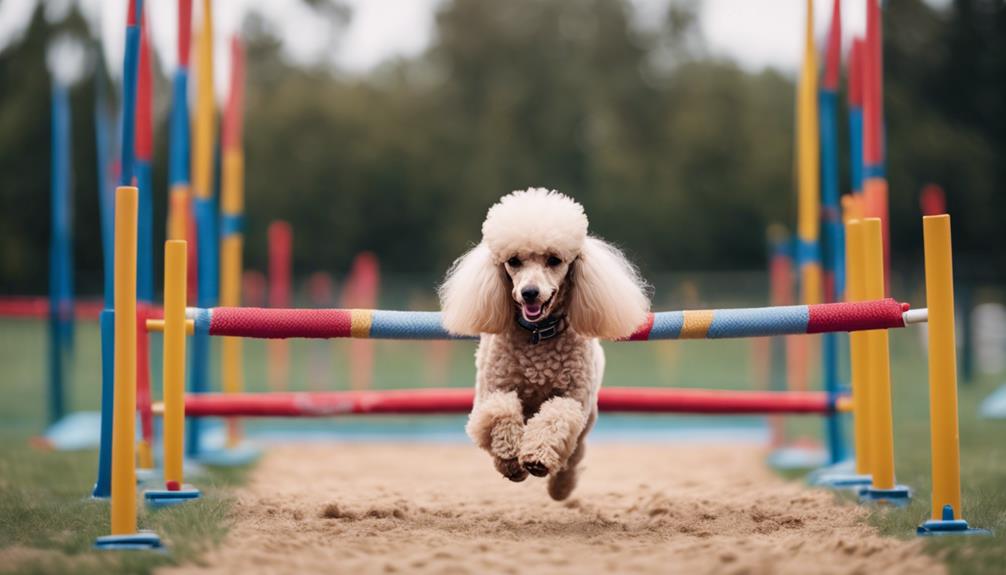
Poodles' exceptional intelligence and trainability set them apart as a breed that excels in problem-solving and mastering complex commands. Their cognitive abilities make them adept at understanding various tasks and commands, allowing them to thrive in obedience training and agility courses. Engaging with poodles in mental challenges and interactive activities will harness their problem-solving skills and enhance their trainability in a rewarding manner.
Poodle's Problem-Solving Skills
With their remarkable problem-solving skills and high level of trainability, poodles consistently demonstrate exceptional intelligence in various tasks and activities. They stand out for their cognitive abilities and adaptability, making them a popular choice for various roles due to their quick learning and precision in executing commands. Here are three key points to enjoy about poodles' problem-solving skills:
- Quick Understanding: Poodles showcase rapid comprehension of commands, reflecting their sharp intellect and ability to grasp new tasks effortlessly.
- Precision in Execution: Their problem-solving skills shine through in their precise execution of tasks, emphasizing their attention to detail and focus.
- Adaptability: Poodles' intelligence and trainability enable them to adapt to different environments and challenges, showcasing their versatile problem-solving capabilities.
Trainability for Complex Commands
Ranked as the second most intelligent dog breed, poodles exhibit exceptional trainability for mastering complex commands efficiently. Their high intelligence enables them to quickly grasp new commands, excelling in obedience training. Poodles' history as working dogs has ingrained in them the ability to adapt well to various tasks and commands, making them highly trainable. To teach intricate commands like 'Poodle Jumps,' positive reinforcement is key. Poodles thrive on mental stimulation, eagerly learning tasks like 'sit or stay.' Their problem-solving skills and quick learning aptitude also make them ideal candidates for advanced training programs and competitions. By providing consistent training and using positive reinforcement techniques, you can harness a poodle's intelligence to excel in mastering complex commands.
Sociability and Playfulness
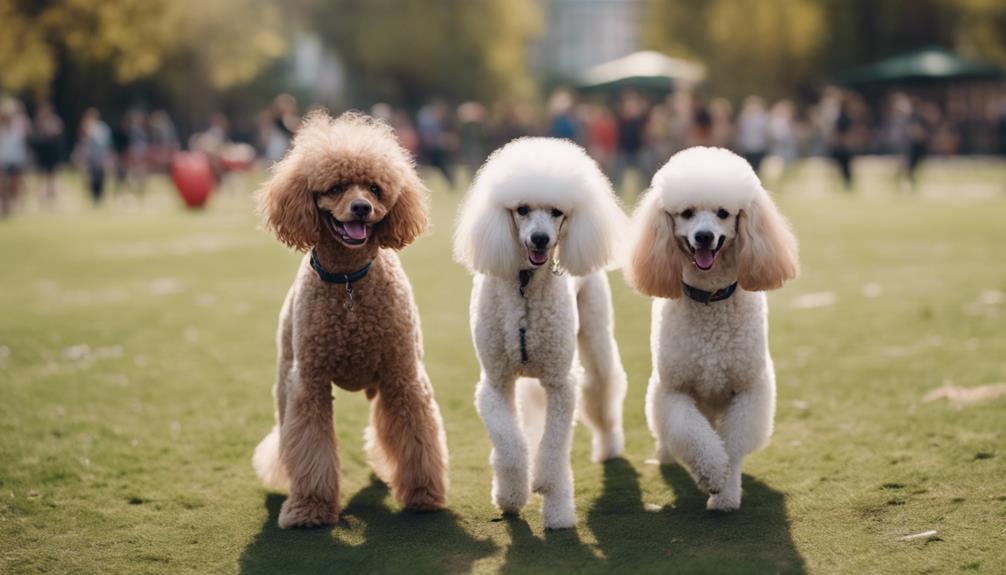
Their sociable nature and love for human companionship distinguish poodles as excellent family dogs. Puppies, in particular, benefit greatly from the social environment poodles provide. Here are some reasons behind the sociability and playfulness of poodles:
- High Intelligence: Poodles enjoy playing with their owners and engaging in interactive games due to their high intelligence. This mental stimulation helps satisfy their need for companionship and prevents boredom.
- Social Development: Poodles thrive on social interaction with people and other pets, requiring regular socialization for proper development. This social exposure from a young age helps them grow into well-rounded and friendly companions.
- Active Lifestyle: Their playful demeanor and enthusiasm for activities make them ideal companions for families with an active lifestyle. Poodles not only enjoy playtime but also thrive in environments that encourage physical and mental engagement.
Understanding these aspects of poodle behavior can help owners create a fulfilling and enjoyable experience for both the dog and the family.
Energy Levels and Exercise Needs
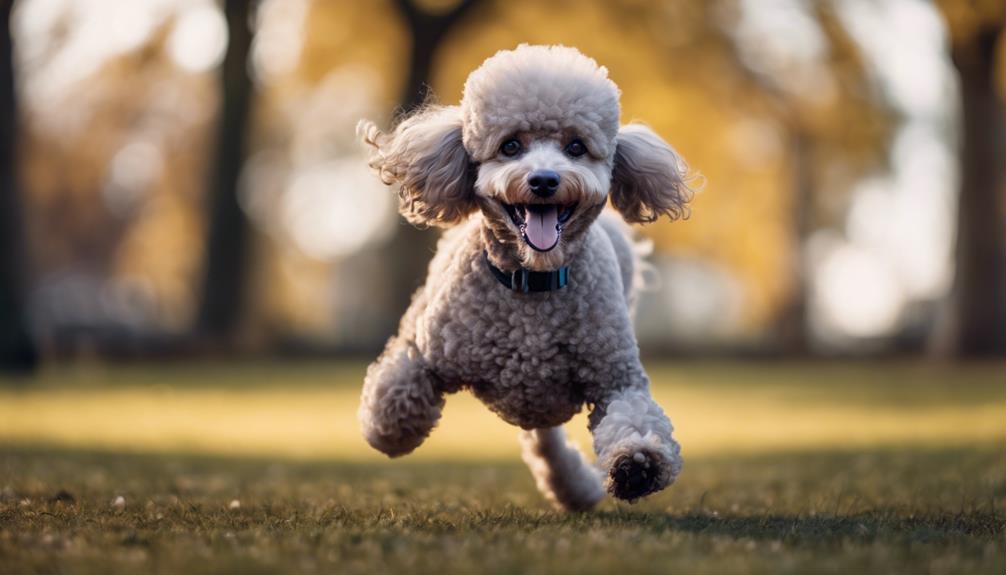
To maintain the health and happiness of your poodle, ensuring they receive approximately 40 minutes of daily exercise is crucial. Poodles, known for their intelligence and agility, are one of the most active breeds in the world. Regular exercise not only keeps them physically fit but also helps in channeling their energy positively. Depending on the size of your poodle, the exercise needs may vary, with toy poodles requiring less activity compared to standard poodles. Without adequate exercise, poodles may exhibit behavioral issues stemming from pent-up energy, such as excessive barking or destructiveness. Engaging in activities like walks, playtime, and training sessions can effectively meet the exercise requirements of your poodle. This not only benefits their physical well-being but also strengthens the bond between you and your furry companion. Remember, providing ample opportunities for exercise is essential for poodles of all ages, ensuring a happy and contented pet.
Grooming and Coat Care
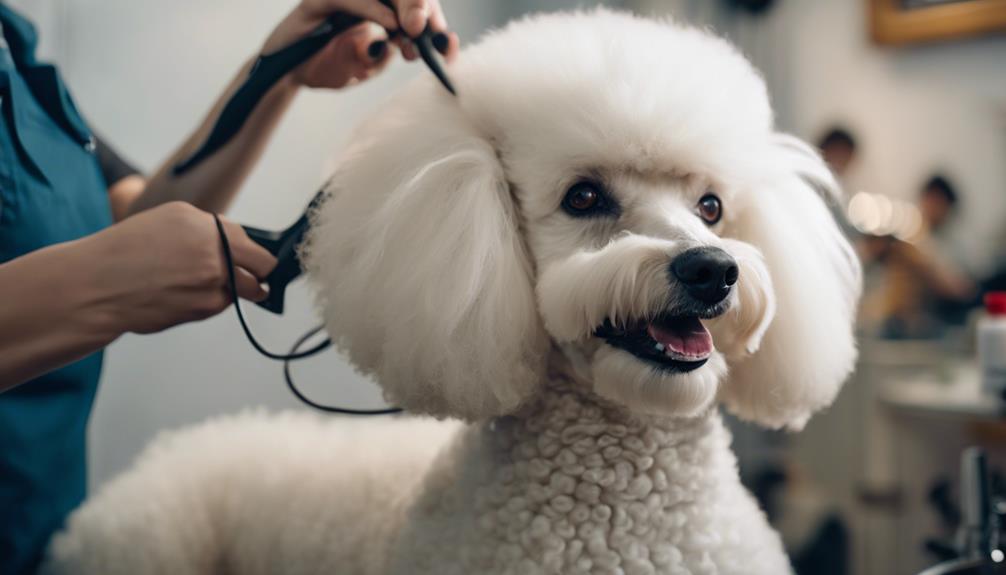
To maintain your Poodle's distinctive coat, you must adhere to a strict grooming routine that includes regular brushing and combing using appropriate tools. Proper coat trimming techniques are essential to prevent matting and maintain the health of your Poodle's curly, dense fur. Managing shedding seasons requires a strategic approach to keep your Poodle's coat clean and healthy.
Brushing Frequency and Tools
For effective grooming and coat care of poodles, daily brushing is essential to prevent matting and tangles in long coats. Here are three key points to consider when it comes to brushing frequency and tools for your poodle:
- Coat Maintenance and Shedding Control: Regular grooming sessions help distribute natural oils and prevent excessive shedding, keeping your poodle's coat healthy.
- Brushing Techniques and Grooming Routine: Utilize a slicker brush or a comb designed for poodle coats to effectively remove debris and knots, ensuring a well-maintained appearance.
- Preventing Matting and Tangle Prevention: Adjust the brushing frequency based on your poodle's coat length and activity level to prevent matting and tangles, maintaining a smooth and manageable coat.
Coat Trimming Techniques
Regular grooming of your poodle's coat through precise trimming techniques is crucial for maintaining its health and appearance. Poodle coat styling can range from the classic 'puppy cut' to the intricate 'continental clip,' each requiring specific trimming tools like clippers, shears, and combs. Preventing matting is essential through regular trimming to avoid tangles, mats, and debris buildup. Before trimming, ensure the coat is brushed thoroughly to remove loose hair and prevent matting, resulting in a smooth and even cut. Experienced groomers can achieve intricate patterns such as poms, bracelets, and topknots to enhance your poodle's overall look. Mastering these techniques will not only keep your poodle looking its best but also contribute to its overall well-being.
Shedding Season Management
During shedding season, managing your poodle's coat through proper grooming and care techniques is essential for maintaining its health and appearance. Here are some tips to help you navigate shedding season effectively:
- Shedding prevention: Regular brushing and bathing help remove loose hair and prevent matting, reducing shedding around your home.
- Coat maintenance: Tailor grooming techniques based on your poodle's coat type (curly, wavy, straight) to effectively manage shedding and maintain a healthy coat.
- Allergies and shedding triggers: Be mindful of common allergens like pollen or dust that may exacerbate shedding. Keeping your poodle's environment clean can help reduce allergic reactions and shedding.
Poodle's Affectionate Nature

Poodles demonstrate their affectionate nature through seeking physical contact, cuddling, and staying close to their beloved human companions. These affectionate gestures are a hallmark of the breed, as they thrive on emotional connections and bonding behaviors. Poodles are known for actively seeking out attention and affection from those they love, often displaying their fondness through gestures like licking, leaning, and following their owners around. Their desire for physical closeness and cuddling sessions further solidify the strong bonds they form with their family members.
This affectionate nature is not only endearing but also plays a crucial role in the overall well-being of poodles. The emotional connection they establish with their human companions contributes to their happiness and contentment. By engaging in bonding behaviors and seeking out affection, poodles create a strong foundation for a loving and fulfilling relationship with their owners. Embracing and reciprocating their affection can deepen the bond between poodle and human, fostering a harmonious and loving environment for both.
Food Drive and Appetite
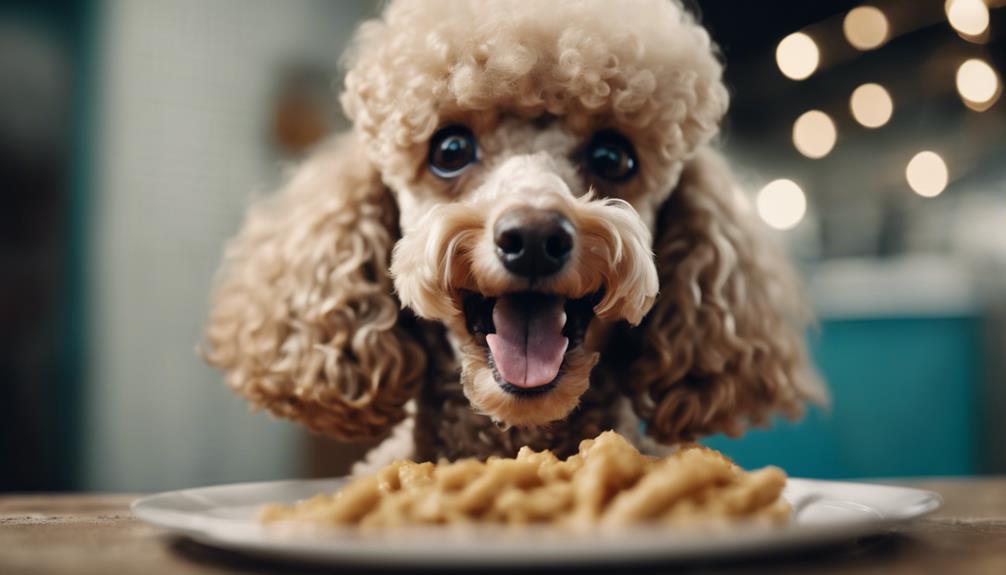
Poodles possess a moderate to high food drive, which can lead to enthusiastic eating habits. Without proper training, they might display food-related behaviors such as begging or scavenging. Monitoring their food intake and providing balanced meals are essential for managing their appetite quirks effectively.
Poodle's Food Drive
With a strong innate drive for food rooted in their hunting heritage, Poodles exhibit a keen appetite that can be effectively leveraged in training and daily care routines.
Key Points to Consider:
- Treat Training Techniques: Poodles respond well to treat-based training due to their high intelligence and food motivation.
- Reward-Based Behavior: Using high-quality treats in training sessions reinforces positive behaviors and strengthens the bond between Poodles and their owners.
- Portion Control Strategies: Monitoring food intake and adjusting treats based on activity level, age, and health status is essential to prevent obesity and maintain a balanced diet for Poodles.
Appetite Quirks
In exploring the intricacies of poodle behavior, a crucial aspect to consider is their appetite quirks, particularly the interplay between food drive and appetite. Poodles are known for their strong food drive, often displaying enthusiastic eating habits. However, some poodles may exhibit finicky appetites, being selective about their food choices. Monitoring food intake is essential to prevent obesity, especially in toy and miniature poodles. Understanding your poodle's feeding preferences, mealtime behaviors, and individual appetite quirks is key. Factors such as age, activity level, and overall health can influence a poodle's appetite. Tailoring their diet and implementing weight management strategies based on these factors can contribute to their optimal health and well-being.
Poodle's Alertness and Watchfulness

Their keen senses and natural instinct for vigilance make poodles excellent watchdogs, always alert and watchful for any potential threats. Poodles' watchfulness is a result of their innate ability to detect even subtle changes in their environment, allowing them to be quick to alert their owners to any potential dangers or visitors. However, this vigilant behavior can sometimes lead to excessive barking at unfamiliar sounds or movements. Here are three essential points to consider regarding a poodle's alertness and watchfulness:
- Alertness training techniques: Implementing training methods that focus on honing a poodle's alertness can help channel their watchdog instincts effectively.
- Watchfulness in poodles: Understanding and appreciating a poodle's natural inclination towards watchfulness can aid in building a strong bond between the dog and its owner.
- Managing barking behavior: Developing strategies to manage and control a poodle's barking tendencies can ensure that their alertness is expressed appropriately without becoming a nuisance.
Behavioral Challenges to Address

When addressing behavioral challenges with Poodles, it's essential to implement effective training strategies to tackle disobedience. Socialization techniques can be beneficial in curbing undesirable behaviors like excessive humping or growling. Handling aggression issues promptly and seeking professional guidance when needed will contribute to a well-rounded approach to addressing behavioral challenges in Poodles.
Behavioral Training Tips
To effectively address behavioral challenges in Poodles, establish clear rules and provide consistent guidance in their training. Here are three key tips to help you manage your Poodle's behavior effectively:
- Positive Reinforcement: Use rewards like treats, praise, or playtime to encourage good behavior and reinforce obedience.
- Behavior Modification: Identify the root causes of undesirable behaviors such as chewing or paw licking and tailor your training to address these specific issues.
- Consistent Training: Maintain a regular training schedule and ensure that all family members are on board with the rules to avoid confusion and inconsistencies in your Poodle's learning process. By incorporating these strategies, you can better manage and correct behavioral challenges in your beloved Poodle.
Socialization Techniques
How can proper socialization techniques help address behavioral challenges in Poodles? Socialization is key to preventing issues like aggression and fear in Poodles. During the critical period of 8-16 weeks, exposing your puppy to various environments, sounds, and situations is crucial. Positive interactions with people and animals, along with outdoor exposure, can shape a Poodle's behavior positively. Socialization milestones, such as meeting new friends and experiencing different stimuli, are essential. Incorporating socialization games can make the process enjoyable for your Poodle while promoting adaptability and sociability. By starting early and using positive reinforcement, you can help your Poodle become a well-adjusted, confident, and friendly companion in various social settings, reducing the likelihood of anxiety or fearfulness later in life.
Handling Aggression Issues
Handling aggression issues in Poodles requires a comprehensive understanding of the underlying triggers and the implementation of appropriate training techniques to modify aggressive tendencies effectively. Aggression triggers can vary, including fear, territorial instincts, or lack of socialization. To address these challenges, consider the following:
- Identifying Triggers: Recognize the specific situations or stimuli that provoke aggressive behaviors in your Poodle.
- Seeking Professional Help: Consult with a professional trainer or behaviorist to develop a tailored training plan to address aggression.
- Emphasizing Socialization: Encourage positive interactions with other dogs and people to help your Poodle overcome fear and build confidence.
Poodle's Sensitivity to Environment

Poodle behavior demonstrates a notable sensitivity to changes in their environment, which can manifest through various anxious reactions and responses. Environmental triggers such as loud noises or new surroundings can easily unsettle a poodle, leading to behaviors like trembling or hiding. Coping mechanisms for these sensitivities can include creating a safe space, offering comforting routines, or using behavior modification techniques. Sensory sensitivities play a significant role in how poodles react to their surroundings, making desensitization techniques vital for managing their anxiety. Poodles, being attuned to their owners' emotions, often mirror their feelings, further highlighting the importance of maintaining a stable and predictable environment. To support a poodle's well-being and mental health, it is crucial to address their sensitivity to environmental changes with patience and understanding.
| Environmental Triggers | Coping Mechanisms |
|---|---|
| Loud Noises | Create a Safe Space |
| New Surroundings | Offer Comforting Routines |
| Changes in Routine | Behavior Modification |
| Owner's Emotions | Desensitization Techniques |
Curiosity and Exploration Tendencies
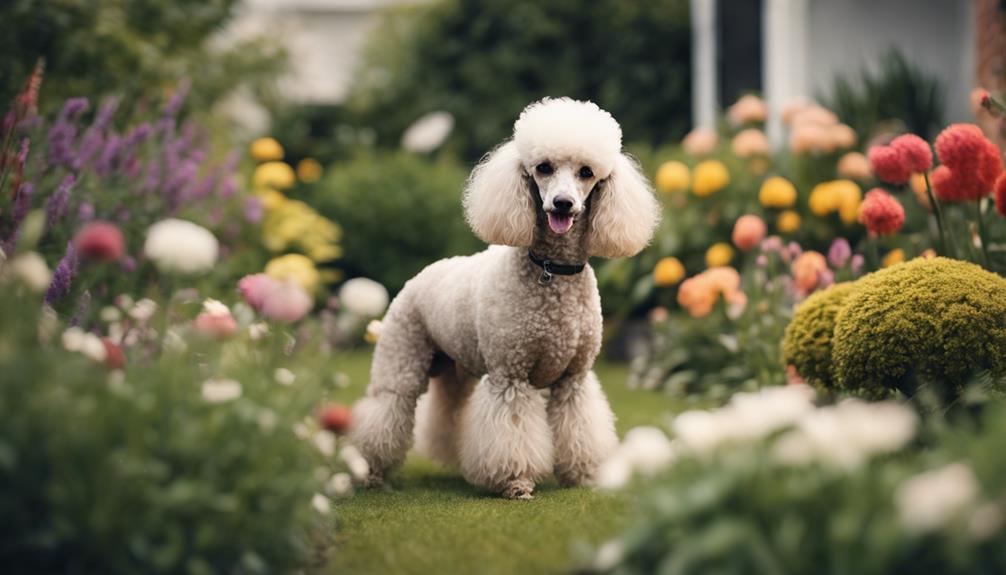
Given the poodle's innate curiosity and exploration tendencies, their behavior often reflects a keen interest in investigating and engaging with their surroundings to satisfy their inquisitive nature. This curiosity can manifest in various ways, such as sniffing, pawing, and inspecting new objects or areas. To cater to this aspect of their personality, here are a few insights to help you better understand and engage with your curious poodle:
3 Insights to Consider:
- Training Techniques: Utilize positive reinforcement methods to encourage desirable exploratory behaviors and discourage unwanted ones.
- Enrichment Activities: Engage your poodle's curiosity through interactive toys, puzzle feeders, and activities that stimulate their mind and satisfy their need for exploration.
- Behavioral Challenges: Be mindful of potential challenges that may arise from their curiosity, such as getting into mischief or becoming easily distracted, and address these through consistent training and mental stimulation.
Understanding and embracing your poodle's curiosity can lead to a more enriching and fulfilling relationship for both you and your furry companion.
Vocalization and Communication Habits

Poodles exhibit a diverse range of vocalizations that convey various emotions and needs, including barking, whining, growling, and howling. These vocalization nuances serve as communication cues that poodle owners can learn to interpret to understand their pet's emotional expressions better. For instance, whining in poodles can indicate a need for attention or discomfort, whereas growling might signal fear or a protective instinct. By paying attention to these vocal cues, you can strengthen your bond and communication with your poodle companion. Understanding when your poodle is alert, anxious, excited, or wary based on their vocalizations can help you respond appropriately to their needs. By acknowledging and responding to your poodle's vocal expressions, you can create a harmonious environment where both you and your poodle feel understood and connected.
Poodle's Adaptability to Change

Adapting effortlessly to new circumstances, the poodle's exceptional intelligence and flexibility make it a standout companion for those seeking a versatile and accommodating pet. Here's why you'll appreciate your poodle's adaptability:
- Transitioning routines: Poodles excel in adjusting to changes in their daily schedules. Whether it's a shift in feeding times or modifications in exercise routines, poodles can adapt swiftly with the right guidance.
- Adapting environments: With their keen intellect and social nature, poodles can acclimate to new environments seamlessly. Moving to a new home or introducing them to unfamiliar surroundings becomes easier due to their adaptable nature.
- Coping changes: Poodles thrive on mental stimulation, making them adept at coping with unexpected changes. By providing consistent training and positive reinforcement, you can help your poodle embrace and navigate through various changes effectively. Their ability to interact positively with new experiences and challenges showcases their remarkable adaptability to change.
Common Poodle Quirks

When observing a poodle's behavior, one can't help but notice their endearing and distinctive quirks that set them apart from other breeds. Poodles exhibit various quirky behaviors that make them truly unique companions. Let's delve into some common Poodle quirks through a detailed analysis in the table below:
| Poodle Quirks | Description | Example |
|---|---|---|
| Poodle communication quirks | Poodles may use a combination of barks, whines, and body language to express their needs and emotions. | Poodle tilting its head while listening attentively. |
| Poodle sleeping habits | Poodles are light sleepers and may prefer to sleep in close proximity to their owners for security. | Poodle curling up in a ball next to you on the couch. |
| Poodle playtime preferences | Poodles enjoy interactive play that stimulates their intelligence, such as puzzle toys or agility games. | Poodle bringing a ball for a game of fetch. |
Understanding these quirks can help you better connect with your Poodle and cater to their unique needs, ensuring a harmonious relationship filled with joy and companionship.
Frequently Asked Questions
What Are the Personality Issues of Poodles?
You might notice that poodles can struggle with separation anxiety, socializing challenges, and training difficulties. They may become overly attached, making it hard to leave them alone. Addressing these issues through proper training and care is essential.
What Are the Behaviour Characteristics of a Poodle?
When it comes to poodle behavior, you'll notice their strong social tendencies, playful nature, and potential training challenges. They thrive on human interaction, require mental stimulation, and may exhibit behaviors like jumping or nipping, which can be managed through consistent training.
What Is the Temper of a Poodle?
Your poodle's temperament evaluation is key to understanding their behavioral tendencies and emotional responses. Training and socialization play crucial roles in shaping their friendly and alert nature. With the right care, poodles make excellent companions.
What Are the Abilities of a Poodle?
You possess intelligence that sets you apart. Your agility and obedience shine through tasks. With dedication, your poodle instincts guide you. Trust your empathetic nature to excel in all you do. Your abilities are boundless.
Conclusion
In conclusion, understanding poodle behavior is key to developing a strong bond with your furry companion. By recognizing their intelligent nature, sociable tendencies, and energy levels, you can provide the necessary training and care to ensure a happy and fulfilling relationship. Remember, like a well-groomed coat, a well-trained poodle shines brightly in your life, bringing joy and companionship for years to come.
